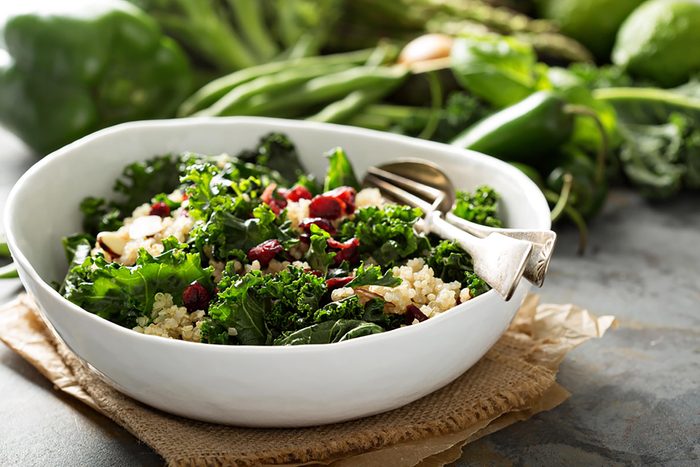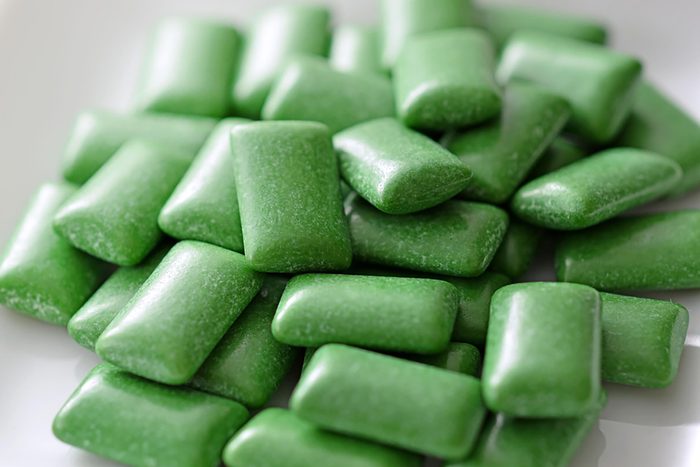
You ate a big kale salad (go you!) and now feel pretty bloated
Your stomach’s saying: You piled on too big a portion. Obviously, veggies are super healthy for your body, including your GI system. In fact, they supply the fiber that basically helps clean you out. But that’s also why it can be too much of a good thing. “If you give anyone enough veggies, they’ll end up pretty uncomfortable with bloating and gas,” says David Meyer, MD, chief gastroenterologist at Kaiser Permanente in Atlanta, Georgia. Don’t think you have to limit the amount you eat. Instead, be more conscious about having smaller portions—and more of them—throughout the day. This is when incorporating veggies into at least one snack (like crudités and hummus in the afternoon) can come in handy. (Try chowing down on one of these 13 foods to relieve belly bloat.)

When you eat mangoes, you get…bloating and gas
Your stomach’s saying: Rethink your fruits. If you’re gassy in response to certain foods, doctors often suggest patients educate themselves on the FODMAP diet. (It stands for Fermentable Oligosaccharides, Disaccharides, Monosaccharides And Polyols. Whew!) Often recommended for people with IBS, FODMAP teaches you how to avoid the carbohydrates in foods that are more likely to cause trouble, and eat more of the ones typically more tolerable. In terms of fruit, the ones to limit include apples, pears, peaches, cherries, mangoes, cherries, and watermelon. Better options are bananas, blueberries, and grapefruit. “It’s very simple to try and often effective. You can be as strict as you want with it,” says Dr. Meyer. Learn more about what eating a low-FODMAP diet really means.

You sometimes get diarrhea after eating a turkey sandwich
Your stomach’s saying: Are you sure you’re not lactose intolerant? Many people don’t realize they may be lactose intolerant because they don’t drink milk. “They might not think they eat much dairy, but they have some cheese on their sandwich or creamer in their coffee, and that’s enough to cause subtle symptoms,” says Dr. Meyer. Watch for stomach issues like bloating and gas, diarrhea, or cramping. Dairy is the top food intolerance, he says, so if you suspect that’s the case for you, skip formal testing (it’s often extensive and unnecessary) and instead be strict and cut out all dairy for two to four weeks to see if you have fewer symptoms, he says. These are the 10 possible medical reasons behind chronic diarrhea.

But. Weird! You are totally fine having that morning yogurt
Your stomach’s saying: Lactose intolerance is different in everyone. If you find that milk and ice cream leave you with a stomach ache and running for the bathroom but that Greek yogurt is totally fine, know the condition isn’t one-size-fits-all. “There are definitely people who can tolerate different types of dairy and some who can’t eat any at all,” says Dr. Meyer. That’s why it helps to pay close attention to what you eat and your symptoms. You’d hate to unnecessarily avoid a food you love, right?

When you pop in a stick of gum, you can practically feel your belly cramp up
Your stomach’s saying: Lay off the gum. There are two things at play here. One, you could be swallowing air as you chew, which basically blows you up like a balloon. Two—and more likely—it’s the artificial sweetener in the sugar-free gum you’re chomping. Artificial sweeteners aren’t digested by your body, which allows GI bacteria to interact with it and form more air. If you don’t notice this happening, you probably don’t have a problem with artificial sweetener, and the gum is just fine, says Dr. Meyer. If you do, the fix isn’t to chew sugar-laden gum (nutritionist and dentists definitely don’t suggest that). Instead, quit the chewing habit. Make sure you know these 7 different types of stomach pain and what they mean.

You’re burping a lot—and it’s burning your throat
Your stomach’s saying: Find your trigger foods. This is one symptom of acid reflux, a condition that is so variable from person to person. For instance, there are classic trigger foods that set off symptoms, like alcohol or caffeine, greasy food, chocolate, and even peppermint. But you’ll likely find ones that are unique to you, says Dr. Meyer. You can also try eating smaller, more frequent meals, and stop eating at least 90 minutes before going to bed. And of course, losing weight might help. “There are just as many skinny people out there with reflux, but at the same time, I’ve had patients say they’ve lost 20 pounds and the reflux disappeared,” he says.

Ugh. It’s diarrhea. Why?
Your stomach’s saying: You ate something that just did not agree with you. If you’re otherwise healthy and you have diarrhea for several days or a week, it’s no fun—but it’s usually nothing to worry about. “It’s probably caused by a virus or food poisoning, but will run its course and you’ll go back to feeling normal,” says Dr. Meyer. That said, if you have chronic on-and-off diarrhea, it’s much more likely to be a food intolerance, IBS, or an underlying medical condition like Crohn’s or thyroid disease. Keep an eye out for these 9 clear signs of irritable bowel syndrome.

You feel bloated—and it hurts really bad
Your stomach’s saying: You need to go to the bathroom. More than 80 percent of people who get bloated have severe symptoms—and constipation is a common culprit, reports a 2014 study. (It also frequently results in more gas, the researchers say, as bacteria have more time to ferment stool.) Eating small fiber-rich meals throughout the day and drinking at least two liters of water can help. Or give one of these 9 natural stomach ache remedies a try.

You’ve got this burning stomach pain
Your stomach’s saying: Lay off the NSAIDs (non-steroidal anti-inflammatory drugs). Ten percent of ulcers —a sore or hole in the lining of the stomach or duodenum (the first part of the intestine) — are caused by chronic NSAID (ibuprofen or aspirin) use among people, according to the CDC. It can also predispose you to GERD (gastroesophageal reflux disease). In this case, talk to your doctor and come up with a plan if you have a condition that requires long-term treatment with an NSAID. He or she may have you try other medication or take another med, like a proton-pump inhibitor alongside the NSAID to buffer damage to your stomach lining. Make sure you never ignore these 10 other body pains.

Many days, your stomach is just off
Your stomach’s saying: Try a probiotic supplement. It’s safe, easy to take, and can help alleviate a number of GI complaints, says Dr. Meyer. If you’re not having any alarm symptoms (as described below), it’s fine to try a probiotic for a month to see if it saves you a trip to the doctor, he says. There are tons of probiotic supplements out there and most doctors have a list of those that have worked for their patients. Ask yours for a recommendation. Plus, find out why ginger ale for upset stomach doesn’t actually work.

Sometimes your belly is fine, other times it’s completely out of whack
Your stomach’s saying: Log your symptoms. Keep a strict diary with everything that goes into your mouth, recommends Dr. Meyer. Make a column on the left for food/drink and one on the right for your symptoms. Make a note of good and bad days. This isn’t to take to your doctor, but gives you good information on how to manage your symptoms. When you have a good day, you can go back and look at what you ate. It can also help you pinpoint patterns—and foods you’re better off avoiding.

Your stomach is feeling worse and worse
Your stomach’s saying: Make that doctor’s appointment. There are some alarm symptoms—and this is one of them. “It doesn’t mean something terrible is going on with you, but it is a reason to see your doctor,” says Dr. Meyer. Other red flag symptoms include pain that’s becoming more intense and severe, unexpected weight loss, and blood in your stool. “If symptoms are chronic and bugging the heck out of you, see your general practitioner,” he says. Don’t miss these 15 other signs your upper abdominal pain could be an emergency.
